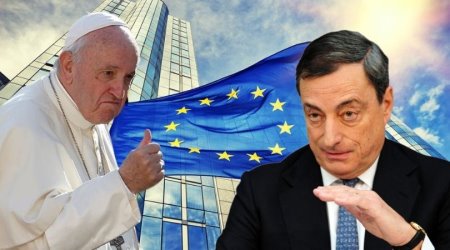By Jules Gomes
Francis and his Jesuit spin doctor Antonio Spadaro are ecstatic over the appointment of Italy’s new prime minister — a Jesuit-trained economist and technocrat who shares the anti-populist and pro-European globalist ideology of the current Vatican regime.
Doctor Mario Draghi, a quasi-Messianic figure nicknamed “Super Mario” for saving the euro from collapse in 2012, will have the pontiff’s strongest support as he steps into the bear pit of Italy’s highly fractious domestic politics, Church Militant has learned.
The 73-year-old Catholic is expected to assume office later this week after Italy’s President, Sergio Mattarella, invited him to form a government of national unity following the collapse of Prime Minister Giuseppe Conte’s fragile coalition.
Within hours of the announcement of Draghi’s nomination to the top job Wednesday, a jubilant Fr. Spadaro was showering the new Jesuit “dragon” with a tweetstorm of adulation — hailing the new incumbent as a “guarantee of solidity” — as Italian media spoke of the “real axis between the Holy See and the [Quirinal] Hill.”
“The figure of Draghi was the protagonist of one of the most complex phases in the recent history of Europe, and therefore his contribution was important to save the monetary union,” Spadaro told Adnkronos.
‘Shrewd Political Power Ploy’
The Italian commentariat remarked on how the pontiff had appointed the economist to the Pontifical Academy of Social Sciences (PASS) in May 2020 as a shrewd political power ploy with the almost prophetic expectation that Draghi would soon assume the reins of power.
“Did Bergoglio anticipate what would happen after about six months in the Italian political scenario?” a number of Italian media outlets are asking. “Certainly, the pope opted at the time for a move that proves how much the former president of the European Central Bank (ECB) is esteemed within the Leonine walls.”
“It was Francis who personally wanted this new entry in the Oltretevere [across the Tiber] think tank in order to strengthen the pro-European vision and the anti-populist approach of the Church,” Il Messaggero commented, calling the pope’s appointment of Draghi to PASS as “halfway between a symbolic endorsement and a political move.”
Globalist Ties Bode Poorly for Italy
Italian commentator Andrea Cionci told Church Militant that “little is known of Draghi’s political thought” because of his deliberately kept reserved and discreet profile, but “the fact that Draghi is a fully fledged part of the globalist system is indisputable.”
Cionci quoted an Italian saying: “Tell me who you are going with and I will tell you who you are,” elaborating:
The fact that Draghi’s appointment was greeted with skyrocketing enthusiasm from the mainstream media, from President of the European Commission Ursula von der Leyen and, above all, sponsored by Pope Francis who, just six months ago, nominated him as — ahead of its time — a member of PASS, should alarm everyone who has critical thinking skills which go beyond the infantile narrative of “the overly competent, great connoisseur of European mechanisms who will save Italy.”
Let’s not forget that Francis’ latest encyclical, Fratelli Tutti, constitutes a de facto declaration of war on Italy as a nation-state. From the economic, political, ethno-demographic, cultural, linguistic, religious, military and identity points of view, if all of Fratelli Tutti’s contents had to be applied, after the course of 10 years no trace of Italy would remain — nothing. Therefore, the fact that Draghi is protected by Bergoglio does not foresee anything positive.
In 2013, Pope Francis granted Draghi and his family an audience. The economist, then president of the ECB (2011–2019), was prominent at a 2016 prize-giving ceremony when Francis was awarded the Charlemagne Prize for his contribution to the unity of postwar Europe.
Draghi’s bond with the Vatican precedes Francis. Draghi is credited with giving the green light to Benedict XVI’s 2009 encyclical Caritas in Veritate on the Church’s social doctrine and commenting favorably on it in his L’Osservatore Romano article “There is no true development without ethics.”
On the eve of the last day of the pontificate of Benedict XVI, Draghi hailed the Bavarian-born pontiff for his “emphasis on ethical concerns in the economic relationships of our globalized world,” in his address to the Catholic Academy in Bayern, Munich.
The Jesuit ‘Red Thread’
But Draghi’s most significant link with Pope Francis is through “the man who whispers in the pope’s ear” — Antonio Spadaro, the Jesuit director of La Civiltà Cattolica — Italy’s oldest Catholic periodical.
“At the Jesuit school in Italy where I was educated, we had a fundamental guiding principle: Our striving for excellence had to be paired with integrity and a moral message — an ultimate sense of purpose in the service of social justice and fairness,” Draghi stressed, referring to his privileged childhood education at Rome’s prestigious Massimiliano Massimo Institute.
Draghi has always maintained relations with the Society of Jesus which, in turn, offers him unqualified support, political commentators point out.
In November 2019, La Civiltà Cattolica published a 13-page article lauding the economist.
“The Contribution of Mario Draghi to Europe,” penned by Jesuit economist Fr. Guido Ruta, praised Draghi’s role as president of the ECB for his “unconventional monetary expansion measures” including controversial quantitative easing — where a central bank purchases longer-term securities from the open market in order to increase the money supply and encourage lending and investment.
“In conditions of extraordinary uncertainty and complexity, Draghi managed to avoid the worst, making innovative and bold decisions, based on rigorous analyzes and in full compliance with his mandate,” wrote Ruta.
It is this Jesuit “red thread” and the Jesuit “old boys’ network” that links the “pontiff of the poor” to a top eurocrat who was executive director of the World Bank (1984–1990), director general of the Treasury (1991–2001), vice president and managing director of Goldman Sachs (2002–2006), and named “man of the year” by the Financial Times in 2012.





